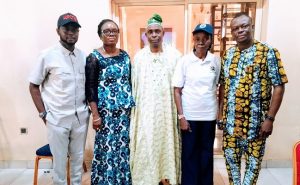The Amalgamated Union of Public Corporations Civil Service Technical and Recreational Services Employees (AUPCTRE) Lagos Chapter has promised to work collaboratively with civil society groups to disentangle women from societal norms that hold them down.

This was the conclusion reached at the AUPCTRE Lagos Chapter Women Retreat on Empowering Women for Exploits which held in Lekki, Lagos.
Chairperson of Women Committee of AUPCTRE in Lagos, Comrade Ngozi Edet, said that the retreat which had notable civil society and union leaders present was a strategy of deepening the intellectual capacity of the female members of the union to take on roles beyond domestics.
She said that women must be encouraged to take on greater challenges to ensure they not only contribute to society but also achieve their lifelong dreams of self-fulfilment.
Executive director of the Renevlyn Development Initiative (RDI), Philip Jakpor, who was Special Guest at the event, said that the quest for women’s emancipation did not begin today – recalling that the 1929 Aba Women’s Resistance, mischaracterised as a “riot” by British colonialists, is the first well planned and coordinated advocacy for inclusion of women in governance in West Africa.
Jakpor said that the women employed a peaceful sit-in approach during their protests, forcing many Warrant Chiefs to resign and forcing the colonial government to abolish warrant chiefs in 1930. Women were also appointed into the native court system.
He went on to mention notable women who also advocated and fought to advance women’s rights including the late Funmilayo Ransome-Kuti who campaigned against unfair taxes on market women and led marches and protests of up to 10,000 women, forcing the ruling Alake at the time to temporarily abdicate in 1949.
He noted that in more recent time there have been women who did not allow societal norms or prejudices to hold them down. They include the former director-general of the National Agency for Food and Drugs Administration and Control (NAFDAC), the late Dr. Dora Akunyili, current director-general of the World Trade Organisation, Ngozi Okonjo-Iweala, Dr. Oby Ezekwesili and author, Chimamada Adichie. He explained that the aforementioned women have been able to strike a balance between their work and their family life.
He thereafter listed some of the immediate challenges to women emancipation in Nigeria and most of Africa which include lack of access to water, impacts of climate change, issues of girl child education, sexual exploitation of girls in schools and lack of women participation in politics and government. He added that the challenges women faced on the issue of land rights and gender-based violence are also key issues women should take up and confront.
He also stressed that women could capacitate themselves to overcome these challenges through continuous training, sharing of experiences, and unity in advancing a common cause.
In her intervention on “The Role of Women in the Trade Union”, Comrade Medinat Balogun, Assistant General Secretary/Gender Officer, National Union of Textile Garment and Tailoring Workers of Nigeria (NUTGTWN), said that women in Nigeria when compared to their counterparts from other African nations do not take active part in leadership of trade unions; and if at all their participation is very minimal.
Balogun explained that while there is increased membership of women in the formal sector there is less participation of women in leadership roles in the unions.
The unionist said that the quest to emancipate women is backed by international bodies such as the International Labour Organisation (ILO) which stipulates that unions should evolve strategies that will consistently encourage equal representation of both men and women in leadership positions because of the following reasons. The body equally recommended that women should account for an increasing proportion of the workforce.
On a sad note, she lamented that the women who have contributed to the growth and development of trade unions are continually being neglected and relegated to the background.
She however noted that SDG 5: Achieve gender equality and empower all women and girls is not only a fundamental human right, but a necessary foundation for a peaceful, prosperous and sustainable world.
She maintained that addressing gender issues is essential for advancing development and reducing poverty, as women are entitled to live with dignity and freedom from want and fear, adding that empowered women contribute to the health and productivity of whole families and communities, and they improve prospects for the next generation.
Her words: “Women’s empowerment is a critical aspect of achieving gender equality. It includes increasing a woman’s sense of self-worth, her decision-making power, her access to opportunities and resources, her power and control over her own life inside and outside the home and her ability to effect change.”
Other speakers at the event were Lagos Chapter Chairperson of AUPCTRE, Comrade Olawale Ige-Jenyo, who said the union is determined to ensure women are not relegated to the background in their activities and leadership.
Earlier, Comrade Abiodun Bakare, AUPCTRE Lagos State Chapter Secretary, said that the retreat should be more frequent so that more women topics can be addressed in the unions and can be trained on issues of equality and equity.
